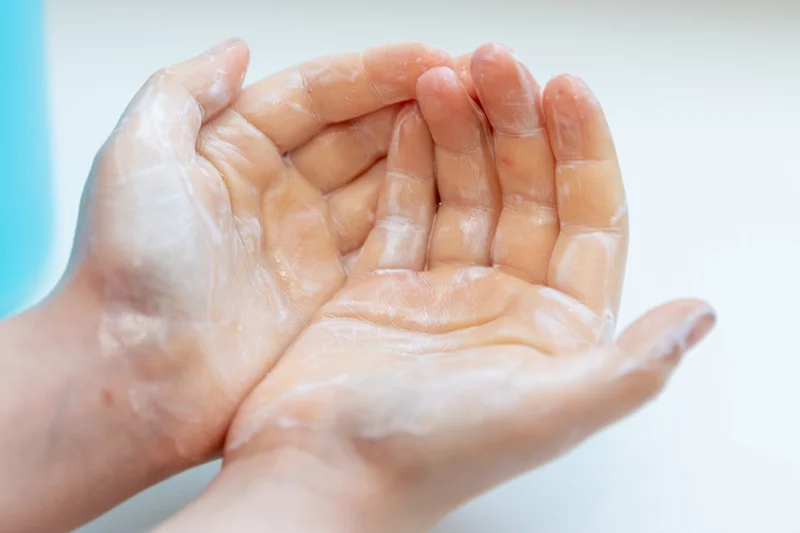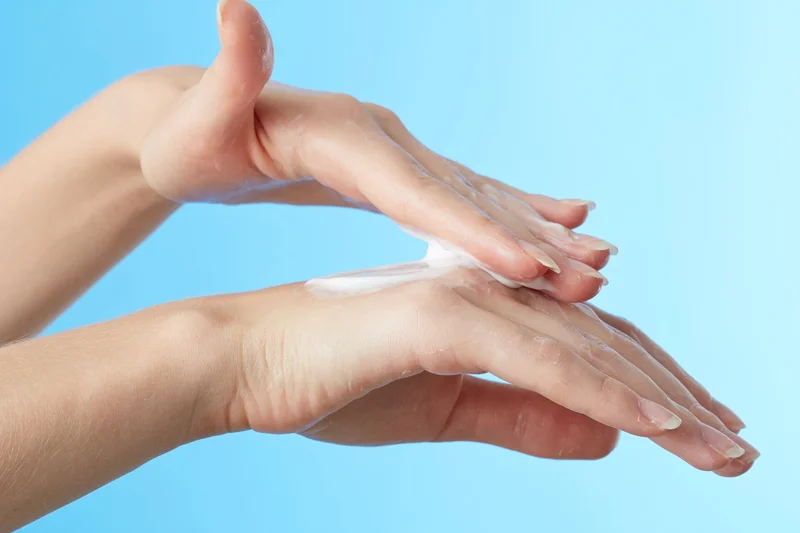Protecting your hands in winter: natural remedies will help against dry ski

Photo source: 123rf.com
Hands can change dramatically, from soft in September to red, rough and cracked from January to March. The main culprit in this situation is lack of skin hydration.
Dry skin and chapped hands are a common problem during the cold season. Hands are one of the most vulnerable parts of the body. Low temperatures, sun, rain, sudden temperature changes or dry indoor air are all possible dangers to skin health. We'll tell you how to protect your hands using natural remedies, and also give tips on how to care for your hand skin in winter.
Hand care. Photo source: 123rf.com
Natural hand moisturizers
In order to provide the necessary skin care in winter, it needs to be moisturized, and this will help us:
- Water. To keep your skin moist, it is advisable to drink an average of 2 liters of water per day.
- Olive oil. Keeps skin soft and elastic. Massage your hands with warm olive oil for 5-10 minutes twice a day. Olive oil can be rubbed into the skin of your hands before bed. Apply the oil to your hands, massage and put on gloves, and enjoy the results in the morning.
- Banana. Mash a small piece of banana with a fork. Apply the resulting mixture to your hands and leave for half an hour, then rinse with warm water. After such a mask, moisturizing hand cream is applied to the skin. You can add a little honey and olive oil to the banana. Mix everything and apply the mixture to your hands. Leave for 15-20 minutes and then wash your hands with warm water.
- Lemon juice. Mix equal amounts of lemon juice, honey and baking soda. Apply this mixture to your hands and massage for about a minute. Then leave it on your hands for another 5 minutes and wash them with warm water. This method can be used once or twice a week. You can also make a softening hand mask from one tablespoon of olive oil and 1 tablespoon of lemon juice: mix and apply to your hands.
- Aloe vera. Cut a fresh aloe vera leaf lengthwise and scrape out the gel. Apply it to your hands and massage lightly for a few minutes. Then leave the mask on for another 10-15 minutes and rinse with warm water. This method can be used up to two times a day.
- Cereals. Mix 2 tablespoons of oatmeal with half or 1 teaspoon of honey and a little water to form a sticky mass, like dough. If desired, you can add lemon juice. Rub the resulting mixture into your hands and leave for 10 minutes. Then wash off with warm water.
- Natural butter. This is an alternative to olive oil. It eliminates cracks and quickly makes your hands soft.
- Coffee grounds. Has a peeling effect, instantly smoothing your hands.
You can also use tea tree essential oil, sweet almond oil, sesame oil or coconut oil. They are very effective. You can also make a moisturizing hand mask using 1 boiled potato, a pinch of dry chamomile and one teaspoon of Vaseline. Mash the potatoes, add Vaseline and chamomile, mix well and apply to hands. Wrap your hands in a cotton napkin and leave for half an hour, then wash off with warm water.
Well-groomed hands. Photo source: 123rf.com
Tips for caring for your hands in winter
Wear gloves. Of course, the best way to protect your hands from low temperatures is to wear good gloves. Do this every time you go outside, because frosty air and cold wind dry out your hands. We recommend that you keep several pairs of gloves in different places so that you always have them on hand.
House cleaning. Photo source: 123rf.com
Rubber gloves for housework. Always try to protect your hands whenever possible when cleaning or washing dishes. Overexposure to hot water and chemicals can strip the skin of its natural oils, drying it out and causing it to crack.
Check the humidity in your home. Use a humidifier or simply place a container of water next to the heater to maintain optimal indoor humidity.
Use moisturizer daily. Apply the cream several times a day to nourish your hands.
Moisturizing hand cream. Photo source: 123rf.com
Apply a deep moisturizer at night. You can use a special moisturizer or Vaseline. Wear cotton gloves to ensure the cream continues to work overnight.
Exfoliate your hands. This will help remove dead skin and improve the penetration of moisturizers. It is recommended to exfoliate your hands once a week so that the skin is restored and thus remains in perfect condition despite low temperatures.
Use mild soap to avoid drying out your skin.
Use warm water in the shower: Hot water strips your skin of its natural oils.
Dry without rubbing. To preserve the epidermis as much as possible, dry the skin without rubbing. It is best to do this with small touches, but without running the towel over the skin.
The girl wipes her hands with a towel. Photo source: 123rf.com
We hope these tips help you. You can also keep moisturizer near the sink so you remember to apply it after washing your hands.